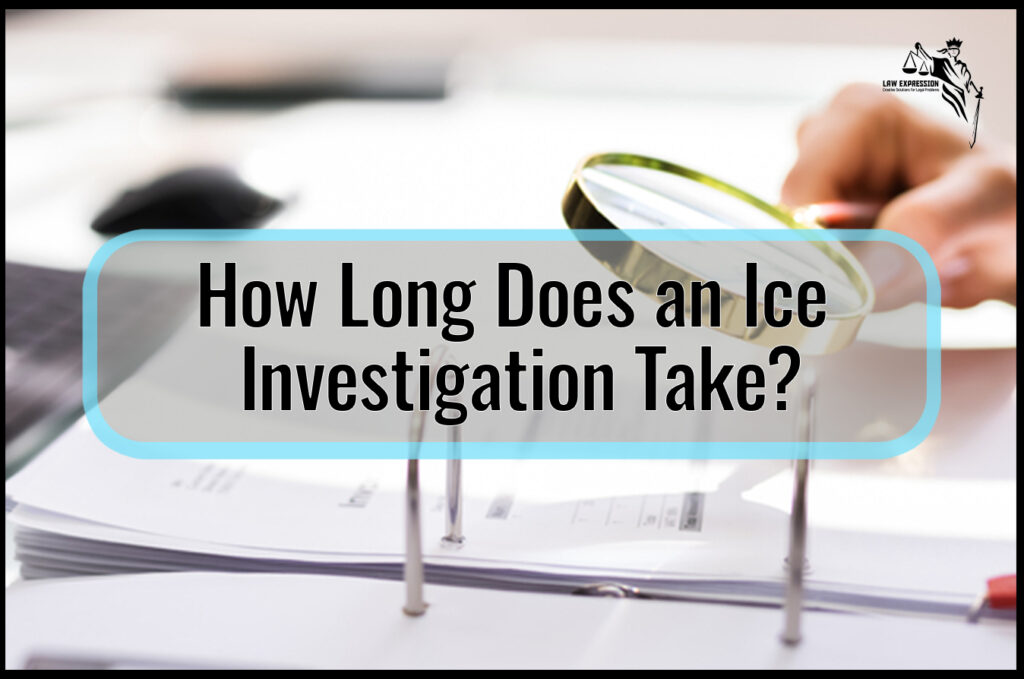How Long Does an Ice Investigation Take?
If you’re the victim of a crime that involved ice, you may be wondering how long the investigation will take. The answer depends on a number of factors, including the severity of the crime, the amount of evidence, and whether or not there are any witnesses. If the crime is minor, such as theft or vandalism, the investigation may only take a few days.
However, if the crime is more serious, like assault or murder, it could take weeks or even months to complete. The amount of evidence also plays a role in how long an investigation takes. If there’s a lot of evidence to sift through, it will naturally take longer than if there’s only a tiny amount.
Finally, witness testimony can also impact how long an investigation takes. If officers need to track down and interview multiple witnesses, that can add considerable time to the process.
When a crime is committed, the first thing that needs to be done is an investigation. Depending on the severity of the crime, this can take anywhere from a few hours to days, weeks, or even months. When a body is found in cold weather conditions, however, there are some special considerations that need to be taken into account.
One of the most important things to remember when investigating a body in cold weather is that ice can act as evidence. Ice can help preserve DNA and other forensic evidence that would otherwise be lost. It’s important to work quickly in order to avoid any damage to this evidence.
In addition to DNA evidence, ice can also provide investigators with information about the time and place of death. By studying the position of the body and any surrounding objects, investigators can get a better idea of how long ago the person died and where they were killed.
Ice investigations can be complex and time-consuming, but they are essential in solving crimes.
With careful planning and attention to detail, investigators can collect vital evidence that will help them solve even the most complicated cases.
What Happens If You Call Immigration on Someone
If you call Immigration on someone, they will be taken into custody and may be deported. If the person is undocumented, they will be detained and processed for deportation. If the person has a green card or is a naturalized citizen, they will be taken into custody and may be deported if they are found to have committed an immigration violation.

How Long Does the Deportation Process Take?
The deportation process can take a very long time. It depends on the country that you are in and the laws that they have in place. In some cases, it can take years for someone to be deported.
How Long Can Ice Hold You before Deportation?
If you are an undocumented immigrant in the United States, you may be wondering how long ICE can hold you before deporting you back to your home country. The answer to this question is not simple, as there are a number of factors that can affect the length of time you may be detained by ICE. One factor that can influence how long ICE will hold you before deporting you is whether or not you have been convicted of a crime in the United States.
If you have been convicted of a crime, ICE may deem you to be a high-risk individual and choose to detain you for a longer period of time before deporting you. Additionally, if you have been charged with a crime but have not yet gone to trial, ICE may also choose to detain you until your case has been resolved. Another factor that can impact the amount of time ICE will hold you before deporting you is whether or not you have already been deported from the United States in the past.
If this is your first time being detained by ICE, it is likely that you will be held for a shorter period of time than someone who has previously been deported and is now being detained again. However, if you have already been deported once before, it is possible that ice will deem you to be a high-risk individual and choose to detain you for a longer period of time before deporting you again. Ultimately, there is no set amount of time that must hold an undocumented immigrant before they can deport back to their home country.
The decision on how long to detain an individual is up to the discretion of the arresting officer and can vary based on the circumstances surrounding each individual case.
Are Ice Complaints Anonymous?
When it comes to filing a complaint with Immigration and Customs Enforcement (ICE), many people are concerned about their privacy and whether or not their information will be kept anonymous. The good news is that ICE complaints are anonymous and your personal information will not be shared with anyone. If you have a concern or complaint about immigration enforcement, you can call the ICE tip line at 1-866-DHS-2ICE (1-866-347-2423) or submit a tip online at https://www.ice.gov/webform/hsi-tip-form.
When submitting a tip, you can choose to remain anonymous or provide your contact information so that an investigator can follow up with you if needed. All tips and complaints submitted to ICE are confidential and the identity of the person who submitted them will not be revealed. Your name, address, phone number, email address, etc. will not be shared with anyone outside of ICE.
If you do provide your contact information when submitting a tip, only authorized ICE personnel will have access to it. So if you have something to report about immigration enforcement activities, don’t hesitate to do so – your anonymity is guaranteed!
What Happens When Detained by Ice?
If you are detained by ICE, you will be held in a detention center until a judge hears your case. You will have the opportunity to call a lawyer and present your case before the judge. If the judge orders you deported, you will be removed from the United States.
Conclusion
Ice investigations are conducted by a special division of the United States Department of Homeland Security. They often take months or even years to complete, and the process is very complicated. Ice investigators use many different techniques to gather evidence and build their cases.
In some cases, they may even need to travel to other countries to interview witnesses or collect evidence.


